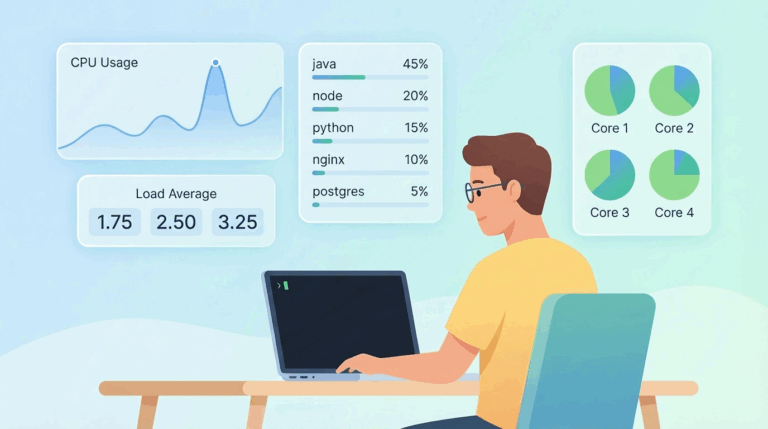In this Linux command line cheat sheet, we will learn:
- Basic Linux Commands
- File management user management Linux Commands
- Programing Linux Commands
- Job management Filesystem management Linux commands
- Process management Linux Commands
- Shortcuts
- network
- System Info
- Searching
- File Permission
Table of Contents
Basic Linux Commands
- cat – Joins and displays files
- cp – Copies files
- cpio – Creates an archive, restores files from an archive, or copies a directory hierarchy
- cut – Selects characters or fields from input lines
- diff – Displays the differences between two text files
- emacs Editor
- expand – Converts TABs to SPACEs
- find – Finds files based on criteria
- grep – searches for a pattern in files
- gzip – Compresses or decompresses files
- head – Displays the beginning of a file
- join – Joins lines from two files based on a common field
- less – Displays text files, one screen at a time
- ln – Makes a link to a file
- ls – Displays information about one or more files
- man – Displays documentation for utilities
- mkdir – Creates a directory
- mv – Renames or moves a file
- nl – Numbers lines from a file
- od – Dumps the contents of a file
- paste – Joins corresponding lines from files
- rm – Removes a file (deletes a link)
- sed – Edits a file noninteractively
- sort – Sorts and/or merges files
- split – Divides a file into sections
- tail – Displays the last part (tail) of a file
- tar – Stores or retrieves files to/from an archive file
- touch – Creates a file or changes a file’s access and/or modification time
- uniq – Displays unique lines from a file
- vim Editor
- wc – Displays the number of lines, words, and bytes in one or more files
File management user management Linx Commands
- cd – Changes to another working directory
- chgrp – Changes the group associated with a file
- chmod – Changes the access mode (permissions) of a file
- chown – Changes the owner of a file and/or the group the file is associated with
- date – Displays or sets the system time and date
- df – Displays disk space usage
- dmesg – Displays kernel messages
- du – Displays information on disk usage by directory hierarchy and/or file
- finger – Displays information about users
- kill – Terminates a process by PID
- killall – Terminates a process by name
- nice – Changes the priority of a command
- nohup – Runs a command that keeps running after you log out
- ps – Displays process status
- renice – Changes the priority of a process
- sleep – Creates a process that sleeps for a specified interval
- stat – Displays information about files
- stty – Displays or sets terminal parameters
- sysctl – Displays and alters kernel variables at runtime
- top Dynamically displays process status
- umask Specifies the file-creation permissions mask
- w Displays information about local system users
- which Shows where in PATH a utility is located
- who Displays information about logged-in users
Programing Linux Commands
- configure – Configures source code automatically
- gawk – Searches for and processes patterns in a file
- gcc – Compiles C and C++ programs
- make – Keeps a set of programs current
- mawk – Searches for and processes patterns in a file
- perl – Scripting language
- python – Programming language
Job management Filesystem management Linux commands
- at – Executes commands at a specified time
- cal – Displays a calendar
- crontab – Maintains crontab files
- echo – Displays a message
- expr – Evaluates an expression
- fsck – Checks and repairs a filesystem
- mkfs – Creates a filesystem on a device
- screen – Manages several textual windows
- tee – Copies standard input to standard output and one or more files
- test – Evaluates an expression
- tr – Replaces specified characters
- tty – Displays the terminal pathname
Process management Linux Commands
- bg – To send a process to the background
- fg – To run a stopped process in the foreground
- top – Details on all Active Processes
- ps – Give the status of processes running for a user
- ps PID – Gives the status of a particular process
- pidof – Gives the Process ID (PID) of a process
- kill PID – Kills a process
- nice – Starts a process with a given priority
- renice – Changes priority of an already running process
- df – Gives free hard disk space on your system
- free – Gives free RAM on your system
Shortcuts
- Ctrl+C – halts the current command
- Ctrl+Z – stops the current command, resume with
- fg in the foreground or bg in the background
- Ctrl+D – log out of current session, similar to exit
- Ctrl+W – erases one word in the current line
- Ctrl+U – erases the whole line
- Ctrl+R – type to bring up a recent command
- !! – repeats the last command
- exit – log out of current session
Network
- ping host – ping host and output results
- whois domain – get whois information for domain
- dig domain – get DNS information for domain
- dig -x host – reverse lookup host
- wget file – download file
- wget -c file – continue a stopped download
- ./ – curret directory right now
- ../ – previous directory
- ~ – the users home directory
- | – pipe the output of one command into another
- > – use command on the following file (overwrite)
- >> – use command on following file (appends)
Compression
- tar cf file.tar files – create a tar named file.tar containing files
- tar xf file.tar – extract the files from file.tar
- tar czf file.tar.gz files – create a tar with Gzip compression
- tar xzf file.tar.gz – extract a tar using Gzip
- tar cjf file.tar.bz2 – create a tar with Bzip2 compression
- tar xjf file.tar.bz2 – extract a tar using Bzip2
- gzip file – compresses file and renames it to file.gz
- gzip -d file.gz – decompresses file.gz back to file
See also: Mastering the Linux Command Line — Your Complete Free Training Guide
System Info
- date – show the current date and time
- cal – show this month’s calendar
- uptime – show current uptime
- w – display who is online
- whoami – who you are logged in as
- finger user – display information about user
- uname -a – show kernel information
- cat /proc/cpuinfo – cpu information
- cat /proc/meminfo – memory information
- man command – show the manual for command
- df – show disk usage
- du – show directory space usage
- free – show memory and swap usage
- whereis app – show possible locations of app
- which app – show which app will be run by default
Searching
- grep pattern files – search for pattern in files
- grep -r pattern dir – search recursively for pattern in dir
- command | grep pattern – search for pattern in the output of command
- locate file – find all instances of file
- find /dir/ -name name* Find files starting with name in dir
- find /dir/ -user name Find files owned by name in dir
- find /dir/ -mmin num Find files modifed less than num minutes ago in dir
File Permissions
- chmod octal file – change the permissions of file to octal, which can be found separately for user, group, and world by adding
- 4 – read (r)
- 2 – write (w)
- 1 – execute (x)
IO Redirection
- cmd < file Input of cmd from file
- cmd1 <(c
md2) Output of cmd2 as file input to cmd1 - cmd > file Standard output (stdout) of cmd to file
- cmd > /dev/null Discard stdout of cmd
- cmd >> file Append stdout to file
- cmd 2> file Error output (stderr) of cmd to file
- cmd 1>&2 stdout to same place as stderr
- cmd 2>&1 stderr to same place as stdout
- cmd &> file Every output of cmd to file
Linux Troubleshooting Guide:
- Troubleshooting Disk Usage In Linux
- Troubleshooting High Load Average on Linux
- Troubleshoot Network Slow Problems In Linux
- Troubleshoot high iowait issue on Linux
Linux Learning Guide:



